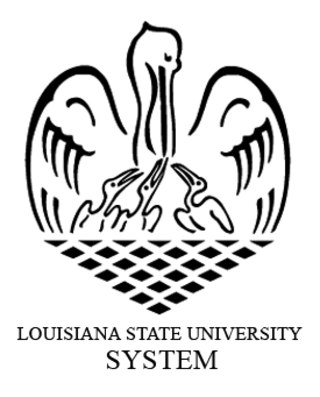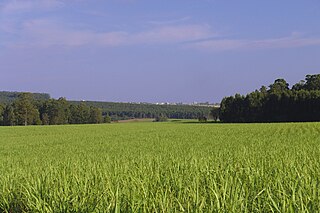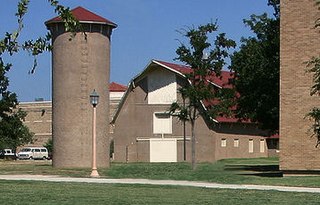
Biofuel is a fuel that is produced over a short time span from biomass, rather than by the very slow natural processes involved in the formation of fossil fuels such as oil. Biofuel can be produced from plants or from agricultural, domestic or industrial biowaste. Biofuels are mostly used for transportation, but can also be used for heating and electricity. Biofuels are regarded as a renewable energy source. The use of biofuel has been subject to criticism regarding the "food vs fuel" debate, varied assessments of their sustainability, and possible deforestation and biodiversity loss as a result of biofuel production.

Louisiana State University is an American public land-grant research university in Baton Rouge, Louisiana. The university was founded in 1860 near Pineville, Louisiana, under the name Louisiana State Seminary of Learning & Military Academy. The current LSU main campus was dedicated in 1926, consists of more than 250 buildings constructed in the style of Italian Renaissance architect Andrea Palladio, and the main campus historic district occupies a 650-acre (260 ha) plateau on the banks of the Mississippi River.

The Louisiana State University System is a system of public colleges and universities in Louisiana. It is budgetarily the largest public university system in the state.

Panicum virgatum, commonly known as switchgrass, is a perennial warm season bunchgrass native to North America, where it occurs naturally from 55°N latitude in Canada southwards into the United States and Mexico. Switchgrass is one of the dominant species of the central North American tallgrass prairie and can be found in remnant prairies, in native grass pastures, and naturalized along roadsides. It is used primarily for soil conservation, forage production, game cover, as an ornamental grass, in phytoremediation projects, fiber, electricity, heat production, for biosequestration of atmospheric carbon dioxide, and more recently as a biomass crop for ethanol and butanol.

Bioenergy is a type of renewable energy that is derived from plants and animal waste. The biomass that is used as input materials consists of recently living organisms, mainly plants. Thus, fossil fuels are not regarded as biomass under this definition. Types of biomass commonly used for bioenergy include wood, food crops such as corn, energy crops and waste from forests, yards, or farms.

Agricultural education is the systematic and organized teaching, instruction and training available to students, farmers or individuals interested in the science, business and technology of agriculture as well as the management of land, environment and natural resources.

Energy crops are low-cost and low-maintenance crops grown solely for renewable bioenergy production. The crops are processed into solid, liquid or gaseous fuels, such as pellets, bioethanol or biogas. The fuels are burned to generate electrical power or heat.
The United States produces mainly biodiesel and ethanol fuel, which uses corn as the main feedstock. The US is the world's largest producer of ethanol, having produced nearly 16 billion gallons in 2017 alone. The United States, together with Brazil accounted for 85 percent of all ethanol production, with total world production of 27.05 billion gallons. Biodiesel is commercially available in most oilseed-producing states. As of 2005, it was somewhat more expensive than fossil diesel, though it is still commonly produced in relatively small quantities.

In the context of energy production, biomass is matter from recently living organisms which is used for bioenergy production. Examples include wood, wood residues, energy crops, agricultural residues including straw, and organic waste from industry and households. Wood and wood residues is the largest biomass energy source today. Wood can be used as a fuel directly or processed into pellet fuel or other forms of fuels. Other plants can also be used as fuel, for instance maize, switchgrass, miscanthus and bamboo. The main waste feedstocks are wood waste, agricultural waste, municipal solid waste, and manufacturing waste. Upgrading raw biomass to higher grade fuels can be achieved by different methods, broadly classified as thermal, chemical, or biochemical.

Bidhan Chandra Krishi Viswavidyalaya (BCKV), also known as Bidhan Chandra Agricultural University, is an agricultural university in West Bengal, India. The university aims to provide higher education in theoretical and technical fields of Agriculture, Horticulture and Agricultural Engineering. It grants Bachelor of Science, Master of Science, Bachelor of Technology, Master of Technology and Doctorate degrees.

E. Travis York, Jr. was an American agronomist, professor, university administrator, agricultural extension administrator, and U.S. presidential adviser. York was a native of Alabama, and earned his bachelor's, master's and doctorate degrees in agricultural sciences. He served as the director of the Alabama Cooperative Extension Service, the administrator of the federal Extension Service, the interim president of the University of Florida, and the chancellor of the State University System of Florida.
China has set the goal of attaining one percent of its renewable energy generation through bioenergy in 2020.
The Bioenergy Program was an initiative of the United States Department of Agriculture Farm Service Agency. The program started on October 1, 2002, and was terminated on June 30, 2006.
North Carolina State University's College of Agriculture and Life Sciences (CALS) is the fourth largest college in the university and one of the largest colleges of its kind in the nation, with nearly 3,400 students pursuing associate, bachelor's, master's and doctoral degrees and 1,300 on-campus and 700 off-campus faculty and staff members.
The University of Maryland College of Agriculture and Natural Resources is the agricultural and environmental sciences college of the University of Maryland and operates the Maryland Sea Grant College in cooperation with the University of Maryland Center for Environmental Science and the National Oceanic and Atmospheric Administration.
United States policy in regard to biofuels, such as ethanol fuel and biodiesel, began in the early 1990s as the government began looking more intensely at biofuels as a way to reduce dependence on foreign oil and increase the nation's overall sustainability. Since then, biofuel policies have been refined, focused on getting the most efficient fuels commercially available, creating fuels that can compete with petroleum-based fuels, and ensuring that the agricultural industry can support and sustain the use of biofuels.

The Louisiana Farm Bureau Federation (LFB) is a state chapter of the United States's largest general farm organization representing farmers, ranchers, and rural residents. The organization provides assistance toward the development and prosperity of Louisiana agriculture. It is a private, non-profit, non-governmental agency established in 1922 to bring a voice to Louisiana farmers and their families. It is based in Baton Rouge, Louisiana.

The Cooperative State Research, Education, and Extension Service (CSREES) was an extension agency within the U.S. Department of Agriculture (USDA), part of the executive branch of the federal government. The 1994 Department Reorganization Act, passed by Congress, created CSREES by combining the former Cooperative State Research Service and the Extension Service into a single agency.
The Colorado State University College of Agricultural Sciences includes five academic departments and offers nine undergraduate majors with many concentration options as well as multiple graduate degree programs. People in the College of Agricultural Sciences lead research and design projects in food production, security, and safety, ecosystem health, landscape design, and human well-being. They also provide extension and participate in engagement in agricultural sciences and landscape architecture.
Florence Avalon Daggett (1907–2002) was an American filmmaker and philanthropist. She is associated with Avalon Daggett Productions, a film production company based in Los Angeles which specialized in short documentary films, and educational films. Many of her later films were produced for the state of Louisiana.












